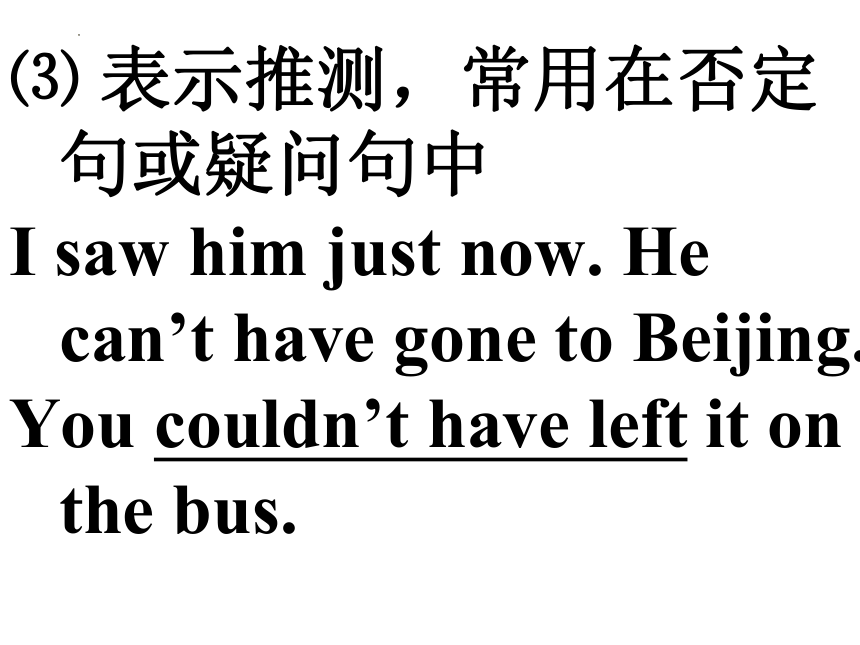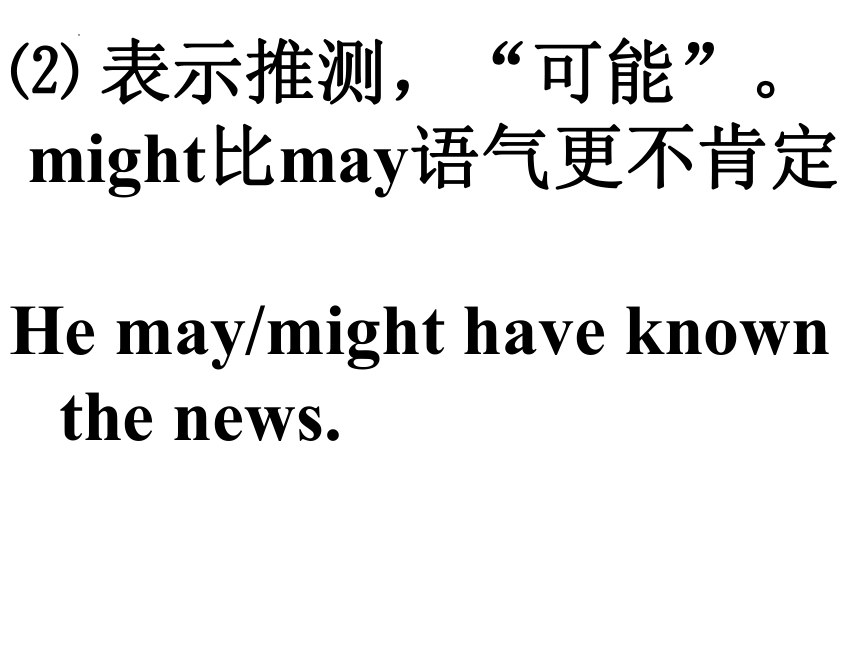2022届高考英语二轮复习:情态动词用法课件(40张)
文档属性
| 名称 | 2022届高考英语二轮复习:情态动词用法课件(40张) |

|
|
| 格式 | pptx | ||
| 文件大小 | 167.0KB | ||
| 资源类型 | 教案 | ||
| 版本资源 | 通用版 | ||
| 科目 | 英语 | ||
| 更新时间 | 2022-05-02 22:44:22 | ||
图片预览












文档简介
(共40张PPT)
情态动词
情态动词表示说话人的语气或对事物所持的态度。
情态动词有一定的词义,但不能单独做谓语。
情态动词没有人称和数的变化,后面应接动词原形
1. can 与 could
⑴ 表示能力,“能,会”
We can use the computer now, but we couldn’t last year.
be able to do sth.表示有能力做某事,并且做了
⑵ 表示请求或允许,在口语中可以用can代替may,但may比can正式
-- May/ Can I come in
-- Yes, you may/ can.
表示请求,口语中常用could代替can,使语气更委婉,但主要用在疑问句中,答语不能用could, 应该用can
– Could I use your pen
– Yes, you can.
或 – No, I am afraid not.
⑶ 表示推测,常用在否定句或疑问句中
I saw him just now. He can’t have gone to Beijing.
You couldn’t have left it on the bus.
(4) 表示客观可能性,表理论上的可能
It is usually very warm in April, but it can be rather cold sometimes.
⑸ 表示惊讶,常用在否定句和疑问句中
How can you be so stupid
How could you do such a silly thing
⑹ cannot ... too ...
can never ... too ...
“无论.....也不为过”
“越......越好”
You can’t be too careful with driving.
2、may 与 might
⑴ 表示请求或许可,“可以”,may比can正式。
-- May/ Can I go now
-- Yes, you may/ can.
might比may语气更委婉,没有时间上的区分。但在might引起的疑问句中,答语不用might, 应该用may
– Might/ May I have a look
– Yes, you may.
或 Yes, please./ Certainly.
No, you mustn’t.
或 No, you’d better not.
⑵ 表示推测,“可能”。
might比may语气更不肯定
He may/might have known the news.
(3) 在机关、学校等的文书、公告中, 表示“不得......”,, “禁止......”,可以用may not或mustn’t
You may not smoke in the classroom.
⑷ might as well
may as well 不妨,最好
You may/might as well do it at once.
⑸ may well 很可能
They may well win.
3、must
⑴ must表示“必须,应当”
mustn’t “禁止”
Soldiers must obey orders.
过去、将来、完成等时态中表示“必须”时,可用have to 的相应形式。
注意must疑问句的答语:
-- Must I go now
-- Yes, you must.
-- No, you needn’t.
No, you don’t have to.
⑵ 表示推测,用于肯定句,表示某事肯定会发生
You must be very tired.
He must have been tired.
(3) (表示不可避免性或肯定性),“必然要,必定会”。
Man must die. 人必有一死
⑷ 表示与说话人愿望相反及不耐烦,“偏要”
Why must it rain on Sunday
4、have to
“必须,不得不”,表示客观需要。而must表示说话人的主观看法。
I don’t have to get up early.
I had to get up early.
I will have to get up early.
(1) should可用于if引导的虚拟条件句,表示语气较强的假设,“万一”
If Mr Li should have time tomorrow, we could ask him questions.
5、shall 与 should
(2) should表示义务、责任
“应当、应该”
We should study harder.
(3) should表示推论、推测、可能性,“应该,可能”
Dinner should be ready by now.
(4)should表示说话者对某事难以置信,感到惊讶,“竟然”
I am sorry that he should be so careless.
6、will 与 would
⑴ 用于第二人称,表示询问对方或向对方提出请求。
would语气更委婉。
Will you send this letter for me
Would you mind my opening the window
⑵ 表示意志、决心和愿望
I will never do that again.
They asked us if we would do that again.
⑶ 表示习惯性、倾向性动作,“会,将会,常常”
Fish will die out of water.
She would sit like that for hours.
7、used to “过去常常”
He used to go there.
否定形式:
He didn’t use to go there.
He usedn’t to go there.
He usen’ t to go there.(不常用)
would 过去常常......
表示过去的状态,只能用used to,不能用would
There used to be a big tree in my yard.
8、need 与 dare
可作实义动词、情态动词
⑴ 作实义动词时:
need “需要”
She needs to be more careful.
dare “敢,敢于”
She dares to go out at night.
二者均有人称、数和时态的变化。
dare做实义动词时
She dares to go out at night.
She doesn’t dare to go out at night.
She doesn’t dare go out at night.
⑵ 作情态动词时:
need “需要”,没有人称、数和时态的变化。
dare “敢,敢于”,没有人称和数的变化,但有过去式 dared
⑶ need 与 dare 用作情态动词时,主要用于疑问句、否定句和条件状语从句,一般不用于肯定句。
⑷
– Need I come
– Yes, you must.
No, you needn’t.
9、ought to
“应该”,语气比should重。
否定形式:ought not to
oughtn’t to
You ought to be careful.
You oughtn’t to have let out the secret.
10、had better
“最好(做)......”
We had better go now.
11、情态动词+have done的用法
1、表示对过去事情的推测
must have done用于肯定句
can have done用于否定句
和疑问句
may/might have done一般用于肯定句和否定句中
2、表示对过去没有实现的事情感到后悔、责备或遗憾
could have done本来可以,本来能够
might have done本来可以
should have done本来应该
would have done本来将会
情态动词
情态动词表示说话人的语气或对事物所持的态度。
情态动词有一定的词义,但不能单独做谓语。
情态动词没有人称和数的变化,后面应接动词原形
1. can 与 could
⑴ 表示能力,“能,会”
We can use the computer now, but we couldn’t last year.
be able to do sth.表示有能力做某事,并且做了
⑵ 表示请求或允许,在口语中可以用can代替may,但may比can正式
-- May/ Can I come in
-- Yes, you may/ can.
表示请求,口语中常用could代替can,使语气更委婉,但主要用在疑问句中,答语不能用could, 应该用can
– Could I use your pen
– Yes, you can.
或 – No, I am afraid not.
⑶ 表示推测,常用在否定句或疑问句中
I saw him just now. He can’t have gone to Beijing.
You couldn’t have left it on the bus.
(4) 表示客观可能性,表理论上的可能
It is usually very warm in April, but it can be rather cold sometimes.
⑸ 表示惊讶,常用在否定句和疑问句中
How can you be so stupid
How could you do such a silly thing
⑹ cannot ... too ...
can never ... too ...
“无论.....也不为过”
“越......越好”
You can’t be too careful with driving.
2、may 与 might
⑴ 表示请求或许可,“可以”,may比can正式。
-- May/ Can I go now
-- Yes, you may/ can.
might比may语气更委婉,没有时间上的区分。但在might引起的疑问句中,答语不用might, 应该用may
– Might/ May I have a look
– Yes, you may.
或 Yes, please./ Certainly.
No, you mustn’t.
或 No, you’d better not.
⑵ 表示推测,“可能”。
might比may语气更不肯定
He may/might have known the news.
(3) 在机关、学校等的文书、公告中, 表示“不得......”,, “禁止......”,可以用may not或mustn’t
You may not smoke in the classroom.
⑷ might as well
may as well 不妨,最好
You may/might as well do it at once.
⑸ may well 很可能
They may well win.
3、must
⑴ must表示“必须,应当”
mustn’t “禁止”
Soldiers must obey orders.
过去、将来、完成等时态中表示“必须”时,可用have to 的相应形式。
注意must疑问句的答语:
-- Must I go now
-- Yes, you must.
-- No, you needn’t.
No, you don’t have to.
⑵ 表示推测,用于肯定句,表示某事肯定会发生
You must be very tired.
He must have been tired.
(3) (表示不可避免性或肯定性),“必然要,必定会”。
Man must die. 人必有一死
⑷ 表示与说话人愿望相反及不耐烦,“偏要”
Why must it rain on Sunday
4、have to
“必须,不得不”,表示客观需要。而must表示说话人的主观看法。
I don’t have to get up early.
I had to get up early.
I will have to get up early.
(1) should可用于if引导的虚拟条件句,表示语气较强的假设,“万一”
If Mr Li should have time tomorrow, we could ask him questions.
5、shall 与 should
(2) should表示义务、责任
“应当、应该”
We should study harder.
(3) should表示推论、推测、可能性,“应该,可能”
Dinner should be ready by now.
(4)should表示说话者对某事难以置信,感到惊讶,“竟然”
I am sorry that he should be so careless.
6、will 与 would
⑴ 用于第二人称,表示询问对方或向对方提出请求。
would语气更委婉。
Will you send this letter for me
Would you mind my opening the window
⑵ 表示意志、决心和愿望
I will never do that again.
They asked us if we would do that again.
⑶ 表示习惯性、倾向性动作,“会,将会,常常”
Fish will die out of water.
She would sit like that for hours.
7、used to “过去常常”
He used to go there.
否定形式:
He didn’t use to go there.
He usedn’t to go there.
He usen’ t to go there.(不常用)
would 过去常常......
表示过去的状态,只能用used to,不能用would
There used to be a big tree in my yard.
8、need 与 dare
可作实义动词、情态动词
⑴ 作实义动词时:
need “需要”
She needs to be more careful.
dare “敢,敢于”
She dares to go out at night.
二者均有人称、数和时态的变化。
dare做实义动词时
She dares to go out at night.
She doesn’t dare to go out at night.
She doesn’t dare go out at night.
⑵ 作情态动词时:
need “需要”,没有人称、数和时态的变化。
dare “敢,敢于”,没有人称和数的变化,但有过去式 dared
⑶ need 与 dare 用作情态动词时,主要用于疑问句、否定句和条件状语从句,一般不用于肯定句。
⑷
– Need I come
– Yes, you must.
No, you needn’t.
9、ought to
“应该”,语气比should重。
否定形式:ought not to
oughtn’t to
You ought to be careful.
You oughtn’t to have let out the secret.
10、had better
“最好(做)......”
We had better go now.
11、情态动词+have done的用法
1、表示对过去事情的推测
must have done用于肯定句
can have done用于否定句
和疑问句
may/might have done一般用于肯定句和否定句中
2、表示对过去没有实现的事情感到后悔、责备或遗憾
could have done本来可以,本来能够
might have done本来可以
should have done本来应该
would have done本来将会
